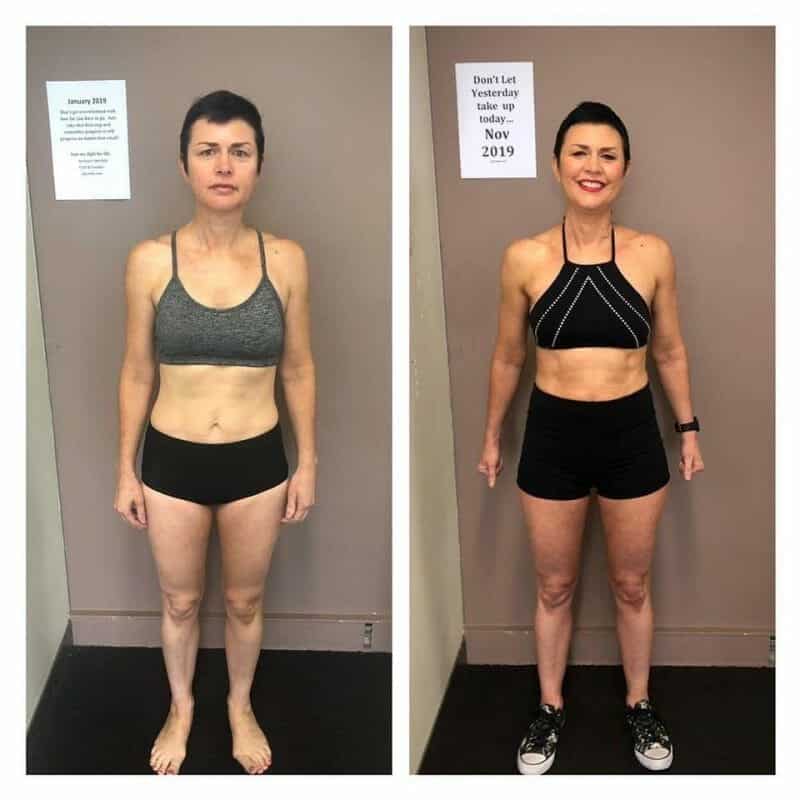Everyone who wants to lose weight wants to lose it fast!
That’s why there are so many 6- and 12-week challenges and fad diets.
While these programs may help you lose weight quickly in the short term, none of them lead to long-term permanent weight loss. Some of them don’t even result in fat-loss. Instead, it may be fluid weight or muscle that you lose.
The reality is that losing weight and keeping it off for good can’t be achieved with a ‘quick-fix’, and anyone who tells you otherwise is lying.
However, there is one thing that will speed up your weight loss results like nothing else.
Data.
What is data?
Data is information that you record, which reveals where you are, what you struggle with, why you struggle with it, and helps give clarity to the solutions that will help you get out of your current situation.
This includes:
- What you eat and drink — what you ate and drank, how much, when you ate it, how you felt afterwards, your hunger levels before and after eating, did you drink alcohol?
- Details about your training and exercise — what you did, how you felt before and afterwards, and what pre- and post-workout meals you had, what other movement did you do during the day
- How does your body feel — do you have any injuries, niggles or tight spots?
- Information about your sleep — how much sleep you’re getting, what time you get to bed, what time you wake up and how your energy levels are
- Data about your mood — do you feel anxious or stressed? positive and happy? Hormonal?
- Details about your behaviours, thoughts and habits — Do you compare yourself with other people? Find yourself doing things to please other people? Drink to ease stress?
Recording information on the above paints a very good picture of where you’re at, what you’re doing, and how it is impacting your body shape and your weight loss.
For example, not eating enough food can slow down your results, as can poor sleep and stress. If you have any tight spots or injuries that may impact your workouts, this could also impact your results.
But it’s your habits that will have the most influence over your body transformation goals. Many people underestimate the power their habits and mindset have over their ability to change their body shape.
For example, if one of your habits is trying to be perfect, this will cause you undue stress. The pursuit of perfectionism will stop you from celebrating your wins, acknowledging invisible success, lead you to focus on negatives, and cause you to procrastinate from taking actions to move you forward.
To lose weight you’ll need to change your habits, but you can’t change habits you’re not aware of. To be aware of these habits, you need to record data.
Data is the difference between permanent weight loss results and yo-yo dieting.
What does recording data do?
While it might sound boring to record information about your sleep, food, mood and exercise, doing so will help you lose weight faster.
Having data means that you and your coach will know what is working, and what’s not working, instead of guessing. You’ll know what needs changing (whether it’s a complete change or a tweak), and what doesn’t need changing. Data will also highlight what habits you’ve mastered, and what habits you still need to change. In a nutshell, having data gives you and your coach more clarity. This clarity gives you the power to keep moving forward to reach your goals.
Data gives you a realistic picture of where you are, why you got there, why you’re still stuck there and where you still need to go. It gives you an awareness that you otherwise wouldn’t have, and it’s this awareness that gives you power to change your circumstances. Data makes you aware and as you know, you can only change things that you’re aware of.
Recording your data also adds an element of accountability to your weight loss journey. And we all know that when you’re accountable, you’re more likely to succeed. Recording precise data gives you precise accountability; and precise accountability equals faster weight loss.
However, the catch with data is that it has to be accurate. Not sugar-coated, not doctored — but 100% accurate.
Data needs to be accurate
When you visit the doctor, do you tell them the real reason you’re there, or do you make up another reason that sounds more ‘acceptable’?
Of course, you tell them the real reason! Because you know that unless you do, you’re not going to be treated properly.
The same applies to the data you provide your coach. Unless you provide them with all the information — the good, bad and the ugly — you won’t succeed with your weight loss.
Let’s look at the example below.
Brian is a very busy executive. He has a stressful job with a lot of responsibility, which can sometimes be difficult to manage. Brian has put on a lot of weight in recent years due to eating poorly because he eats out a lot with his mates. He also has a habit of drinking to relieve his stress. Brian has begun working with a coach to help him lose weight, and to change his lifestyle to a healthier one, as he’s not feeling as good as he used to.
Brian has had an exceptionally busy and stressful day at work. He heads home and finds that there is no food in the fridge. He didn’t do his regular grocery shopping or meal prep over the weekend because he went out with his mates on Saturday night, drank too much and was sick with a hangover the next day. Because there is no food in the fridge, Brian decides to order take-away fish and chips. As he sits down to his meal, he feels that he may as well have a beer, now that he’s gone off track and ordered take-away. One beer turns to four beers. Brian ends up going to bed after midnight and doesn’t sleep well because he feels sick. He snoozes his alarm the next morning and misses his training session with his coach.
Scenario 1
Brian knows that his coach will be disappointed in him for not turning up to training. However, he doesn’t want to be lectured about his habits and why he didn’t turn up. He thinks that everything went pear-shaped because of his drinking, and he tells himself he’ll just make sure it won’t happen again. So Brian tells his coach that he got home late from work, had dinner later than usual and didn’t sleep well during the night because he ate so late. This is why he slept through his alarm and didn’t get to training.
Scenario 2
Brian realises that despite his best efforts and a desire to reach his goals, he is still engaging in behaviours that are sabotaging his success. He sees that being hungover meant that he didn’t get his grocery shopping and meal prepping done. He also realises that he bought take-away because there was no food readily available for him at home after a stressful day and that he drank beer to unwind. Brian believes that he has to stop his habit of drinking but doesn’t know how to do it or where to start. While Brian isn’t proud of what has happened, he comes clean with his coach, and tells her everything, including how much he had to drink on Saturday night, the stressful day he had at work, and what he did when he got home. He knows that his coach will be able to provide the right direction to help him avoid this happening again in the future.
What happens when you provide the wrong data
In scenario 1, Brian is operating from a ‘know-it-all’ mindset. While he is aware of some of his habits, he believes that he knows how to overcome them by himself. However, Brian believes that his habit is around drinking, when it is really about people-pleasing. He will be too busy trying to stop drinking instead of addressing his keystone habit of people-pleasing. This means that he will never address the key habit that is holding him back, and he will never get any permanent results.
He’s also not being accountable, nor responsible for his actions. Brian believes that all he has to do is to ‘make sure this doesn’t happen again’. However, he doesn’t have the awareness, tools or skills to change his habits to prevent a similar thing happening again in the future. He assumes that his coach will ‘lecture’ him about his habits, so instead of being honest, he gives into his fear of facing reality, and instead provides his coach with fake data. What he doesn’t realise is that his coach will provide feedback based on this fake data. The feedback and direction they give won’t enable Brian to begin to change his habits, because they aren’t fully aware of what has happened. So Brian will continue to struggle with his habits, and engage in these same behaviours. This will cause him to become stuck in the same routines, and become frustrated as to why he can’t move forward with his weight loss goals.
In scenario 2, Brian takes full responsibility for his actions and is being accountable by telling his coach everything that has happened. He’s not proud and he’s a bit annoyed with himself, but he knows these habits are deeply ingrained, so he’s willing to ask for help. Brian tells his coaches the full truth and they help him see that his keystone habit is people-pleasing, not drinking. His coach shows him that his habit of people-pleasing had a domino effect in choosing to eat take-away after a stressful day, because if he had said ‘no’ to his friends, he wouldn’t have drunk so much, he would have stuck to his plan of shopping and meal prep, and he would have had food in the fridge. Brian and his coach work together to make a plan for him to prioritise his weekly shop and meal prep, to make sure he’s always prepared.
His coach also recognises that he needs to manage his stress levels better, and develop healthier habits to deal with it, instead of reaching for alcohol. They discuss ways that he can reduce the stress in his week through walking and extra sleep, so he is better able to manage any stress that comes from work. They also identify other routines Brian can use to change his habit loop, when stress levels are rising, which will prevent him from turning to alcohol. For example, when he feels stressed Brian can go for a walk, read a book or listen to music.
Both Brian and his coach know that his people-pleasing habit will take some time to overcome, but they talk about ways that Brian can begin to put himself first without feeling guilty. Brian’s coach gives him accountability to make sure he puts himself first, and implements the steps he needs to, in order to overcome his people-pleasing habits.
The above scenarios show the difference that data can make. In one scenario, limited or fake data is provided which means that the coach can’t help Brian really tackle the things that are holding him back. Brian is left to drift around, and try to figure out things himself.
The second scenario shows what happens when you record 100% accurate data (warts and all), and how doing so actually helps Brian take actions that will help him overcome his habits and enable him to keep moving forward to achieve his goals.
This is the power of data.
Data is the secret code to losing weight fast
While you can get away with not providing data and get a reasonable result, you or your coach will never know how you got there, and how to progress to the next level. This explains why some people get results and then plateau or go backwards.
Without the right data, you won’t get the right prescription. And without the right prescription you’ll never be successful in your weight loss journey.
Lack of data is why so many people fail at weight loss programs, fad diets and 6-12 week challenges. When you don’t have data, you don’t know where you’ve gone wrong and therefore don’t have the power to change things. When you get things right, you don’t know what they are so you don’t know what to keep doing.
To get data, you need to record it consistently, accurately and honestly. You also need to record it over a minimum of 12 months to get enough data to be able to implement changes that will result in long-term weight loss. This explains why 6-12 week quick-fixes don’t work. The one-size fits all approach just doesn’t provide the opportunity to collect enough data, so you’ll always be left guessing.
That’s why at Imani Tribe, our DATSTM Program is a minimum of 12 months commitment. During this time, we provide structure (what to do, when to do it and how to do it) and accountability (helping you make the hard choices that you’ve avoided all your life, that will result in weight loss).
This structure and accountability gives us consistency, which gives us data. Data gives us clarity on what works, what doesn’t work, and what we need to change. Every 6 weeks, we sit down with our clients, look at the data we have, and make a plan on what to work on.
When you follow this formula, you’ll never be stuck. We continue to give you the tools and skills to address one habit at a time, based on the data that you provide. When you master one habit, we move to the next one. Some habits may be addressed in a matter of weeks, others may take months. Once again, fad diets don’t provide this level of structure and accountability, which means you can’t possibly collect quality data to help you overcome your habits.
Because everyone has different habits, a ‘one-size-fits-all’ approach will never work. This is why weight loss programs that include meal plans and generic exercise plans don’t work when it comes to permanent weight loss.
What really works is data.
Remember
- Fake data gives you fake accountability.
- Precise data gives you precise accountability.
- Precise accountability gives you long-term results.
- Data is the thin line between permanent weight loss and yo-yo dieting.


















